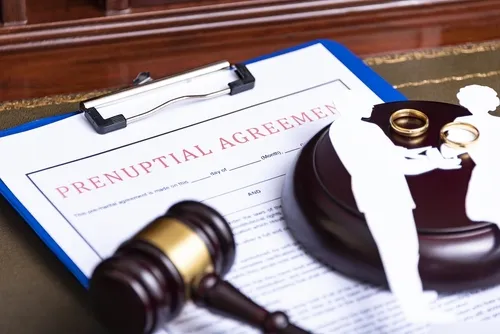When couples in Friendswood, Texas, are planning for marriage or are already married, it’s natural to think about love, commitment, and building a life together. However, it’s also important to consider how to protect your assets and financial future, especially in cases where significant property, businesses, or debts are involved.
Many people are familiar with prenuptial agreements (often called “prenups”), but fewer know about postnuptial agreements (“postnups”). This guide will explain prenup vs postnup agreements.
Hannah Law is a trusted divorce and family law firm in Friendswood, Texas. We assist clients with prenuptial and postnuptial agreements. Our trusted high net worth divorce lawyer can help you safeguard your finances when ending your marriage.
What Is a Prenuptial Agreement?
A prenuptial agreement, or prenup, is a legally binding contract that two people sign before they get married. This agreement typically outlines how assets, debts, income, and property will be divided if the marriage ends in divorce or if one spouse passes away.
Texas is a community property state. A prenup can help both partners agree in advance on how their property will be handled, rather than leaving those decisions up to state law if the marriage ends.
For example, if one person owns a business, a home, or has significant retirement accounts before marriage, a prenup can specify that these assets remain separate property. A prenup can also address issues like spousal support (alimony) and debt division, so both partners know what to expect if things don’t work out.
What Is a Postnuptial Agreement?
A postnuptial agreement, or postnup, is very similar to a prenup, but it is signed after a couple is legally married. Like a prenup, a postnup outlines how assets and debts will be divided in case of divorce or death.
Couples may choose to create a postnup if circumstances in their marriage change. For example, if one spouse receives a large inheritance or starts a successful business, a postnup can help clarify financial responsibilities and protect assets.
Even if you didn’t think about a prenup before getting married, it’s not too late to protect yourself and your family with a postnup.
Prenup vs Postnup: Timing Is Everything
The most obvious difference between prenup vs postnup is the timing of when these agreements are created and signed.
A prenup is completed before marriage, making it a tool for couples to plan ahead as they enter into marriage. It sets expectations and can prevent conflicts, especially if either spouse has significant assets, children from a prior relationship, or wants to protect a family business.
A postnup, on the other hand, is signed after the marriage has already begun. This can be helpful when new issues arise during the marriage, such as one spouse taking on a major debt, receiving an inheritance, or when the couple decides to redefine their financial relationship to protect both parties in case of future divorce.
Because Texas views marriage as a partnership with shared property rights, both prenups and postnups help couples customize how their property will be handled rather than relying solely on state law.
Legal Requirements in Texas for Prenups and Postnups
Both prenuptial and postnuptial agreements must follow specific legal guidelines to be valid and enforceable in Texas.
Texas law on prenuptial agreements requires:
- The prenuptial agreement must be in writing.
- Both parties must voluntarily sign the agreement.
- The agreement must be signed before marriage (it becomes effective once married).
- Both parties must fully disclose their assets and liabilities before signing.
For postnuptial agreements, Texas requires:
- The agreement must also be in writing and signed voluntarily.
- There must be full disclosure of assets and debts.
- Since the couple is already married, there must be consideration—meaning both parties get something of value from the agreement, such as protection of certain assets or clarity on debt responsibility.
In both cases, if one spouse is pressured or coerced into signing, or if the agreement is grossly unfair, a Texas court may later refuse to enforce it. That’s why it’s crucial to work with an experienced family lawyer when drafting either document.
Why Choose a Prenup Agreement?
Many couples opt for a prenup agreement when entering marriage to avoid future disputes. Here are some reasons a prenup may be a good idea:
- Protecting separate property: If you own real estate, a business, investments, or other significant assets before marriage, a prenup can ensure these stay separate.
- Clarifying debt responsibility: A prenup can protect you from becoming responsible for your spouse’s debts.
- Planning for children from a previous relationship: You can protect assets for children from a prior marriage or relationship.
- Avoiding costly and emotional divorce battles: Knowing in advance how assets will be divided can save time, stress, and money if divorce occurs.
- Protecting family businesses: If you are part of a family-owned business, a prenup can prevent your spouse from claiming a share in the event of divorce.
Why Choose a Postnup Agreement?
Just because you’re already married doesn’t mean you can’t protect yourself. Many clients seek a postnup when life circumstances change. A postnup may be beneficial if:
- New assets are acquired: If you receive a large inheritance or start a profitable business after marriage.
- Marriage problems arise: Some couples choose a postnup to define property division if they’re trying to reconcile but want financial security if things don’t improve.
- Debt concerns: If one spouse has taken on substantial debt, a postnup can shield the other spouse.
- Business growth: If a spouse starts a business during the marriage, a postnup can set terms for ownership and division.
Prenup vs Postnup: Which One Is Right for You?
Deciding between a prenup vs postnup depends largely on timing and circumstances. If you’re engaged and thinking about marriage, a prenup allows you to address property, debt, and support issues before tying the knot. If you’re already married and realize you need protection or clarity regarding finances, a postnup is the solution.
For high net worth individuals, both agreements offer peace of mind and can prevent costly disputes in case of divorce. They can also clarify expectations during the marriage and help avoid misunderstandings.
Common Myths About Prenups and Postnups
Many people hesitate to bring up prenups or postnups because they think it’s a sign they don’t trust their spouse or that they expect the marriage to fail. But that couldn’t be further from the truth. These agreements are about planning and protecting both parties.
Another myth is that these agreements are only for the wealthy. In reality, anyone with property, a home, retirement savings, or future earning potential can benefit. Even if you don’t consider yourself “rich,” protecting your current and future assets makes sense.
How a High Net Worth Divorce Lawyer Can Help
A high net worth divorce lawyer is critical if you have significant assets, such as multiple properties, retirement accounts, business interests, and large investments. Whether you are a business owner, investor, or professional with substantial assets, our team can help you.
Our Friendswood attorneys will work to protect your assets and wealth. We often collaborate with accountants, financial planners, and business valuation experts.
Contact Hannah Law Today
Hannah Law provides experienced and compassionate guidance in divorce and family law. Whether you need help with a prenup, postnup, or high net worth divorce, our team will work to protect your financial future.
Contact us today to schedule a consultation.








